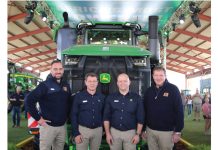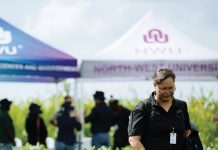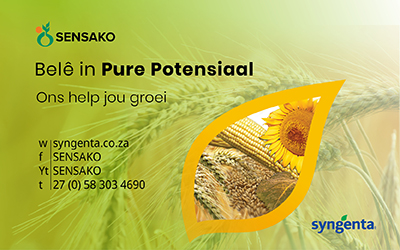Research is an integral part of agriculture and at the centre of it are the agricultural faculties at universities nationwide. The research conducted at these faculties is of immense value to the sector and the future of sustainable agriculture and food security in the country.
As part of our focus on tertiary institutions, SA Graan/Grain found out more about the current research conducted at the University of Pretoria (UP), the University of the Free State (UFS) and the North-West University (NWU).
1. Research focus
We started off by finding out what each faculty’s research focus areas are, and what they expect to focus on in the future.
University of Pretoria
UP’s Faculty of Natural and Agricultural Sciences is known for its wide-ranging expertise in agricultural research and has pioneered and established robust agricultural research programmes with industry and academic partners alike. The faculty has extensive expertise in forestry and agriculture, food systems, biotechnology, life sciences, mathematical and statistical sciences, environmental sciences, infectious diseases, physical sciences, traditional medicines and natural products.
The faculty’s research focus areas include the following:
- Food systems (Includes food security, pre- and post-harvest studies, indigenous crops, agricultural practices, feed and nutrition.)
- One health (Brings together diverse disciplines that deal with the linkages between animal health, human health and environmental health.)
- Natural resource management and environmental change (Includes biodiscovery and biotechnology, climate change and biodiversity.)
Within the agricultural and forestry related sectors, the faculty aims to work closely with industries to remain relevant and provide innovative solutions to real-world challenges. The faculty’s focus areas in terms of crops/industries include fruit and nut crops (avocado and macadamias), forestry, grains and oilseeds, and vegetable crops. The faculty has key expertise, which is applied within and beyond these industries. These include plant health (pathology, entomology and virology), biotechnology, ecology, genetics, crop physiology, applied climate sciences, artificial intelligence in farming, as well as remote sensing.
North-West University
The Faculty of Natural and Agricultural Sciences at the NWU is highly diverse, with research in a wide range of fields related to natural and agricultural sciences. The research, which often overlaps with service rendering activities, is organised broadly in 13 themes, as managed by research entities and centres.
Agricultural sciences (crop and animal) are based mainly at the Mafikeng campus and the Molelwane farm, as well as some agricultural economics as part of the Unit for Environmental Sciences and Management (UESM).
Growth areas that will be highlighted in the future will be based on local needs and global trends, such as data sciences, cyber security, radio astronomy and the always important agricultural sciences with the implementation of applications of the fourth industrial revolution (4IR).
University of the Free State
The Faculty of Natural and Agricultural Sciences at the UFS works closely with the South African agriculture sector, performing research for the private sector, conducting field trials with producers and availing the results for the potential development and commercialisation of the plant growth-promoting rhizobacteria (PGPRs) and the biological control agents (BCAs) that they work with.
Their research is based on producer and industry needs and the approach is to supply objective scientific results with practical solutions or recommendations. Research outcomes did and will continue to be attributes to role-players such as producers (subsistence to commercial), industry (fertiliser, chemical and seed companies), crop insurance companies, agricultural companies and the Department of Agriculture, Land Reform and Rural Development.
The research group focusses on soil microbial ecology, which relates to essential processes within the soil, necessary for plant health and crop production. They are working on isolating PGPRs that have the potential to be used commercially to benefit oilseed crop production.
Agronomic research is focussed on improved crop productivity and food security with an environmental and natural resource attentiveness on crop, farm and regional level.
This includes the following:
- Evaluations of planting techniques (inter- and intra-row spacing) and maturity groups on soybean yield in different agro-ecologies of the eastern Free State are done.
- Cold damage to barley (irrigated) is threatening the sustainable production of this small grain by reducing grain quality of malt barley, rendering it unfit for malt purposes. Research is done in this regard.
- Research is conducted on the constant change in weather events, such as erratic rainfall which could lead to a possible shift in planting date of summer grains, specifically maize.
- Evaluation of crop sequence (rotation), tillage practices and the inclusion of cover crops in cropping systems in long-term field experiments were once more introduced with a holistic and interdisciplinary approach for the southern (Bloemfontein) and northern (Kroonstad) central Free State.
2. Specific focus on grain and oilseeds
Each faculty was also asked what research is done specifically related to grain and oilseeds.
University of Pretoria
The faculty works closely with the grain and oilseed industries, primarily in the summer grain production regions of South Africa. It has therefore established several key research groups of relevance to the sector. These include the National Grain Research Programme (NGRP), as well as groups focussing on applied mycology, cereal foliar pathogen research, crop floral biology and environments, molecular plant physiology, molecular plant-pathogen interactions, and seed science.
Applied mycology: In this research programme, the focus is on a better understanding of the fungal communities that produce mycotoxins in agricultural crops, food and animal feed. Emphasis is placed on the diversity and taxonomy of genera such as Alternaria, Aspergillus, Fusarium, Penicillium and Talaromyces, but many others are also studied. Ultimately, the goal is to secure food and feed from farm to fork for future generations.
Cereal foliar pathogen research: The research group focusses on the interaction between cereal plants and foliar fungal pathogens. Pathosystems currently under study include grey leaf spot in maize (GLS) caused by Cercospora zeina, and northern corn leaf blight (NCLB) in maize and sorghum caused by Exserohilum turcicum. Projects are aimed at studying the population structure of these pathogens, identification and functional characterisation of pathogen effectors causing disease, and cereal plants’ response to pathogen infection.
Crop floral biology and environments: This team’s goal is to understand how changing environments affect floral development, anthesis (flowering from bud opening to pollination) and pollination in economically important crops such as maize and sunflower. The multidisciplinary projects draw together aspects of climatology, plant physiology, plant molecular biology and ecology to holistically address these questions.
NGRP: The vision of the programme is to 1) increase collaboration between government, industry and local universities; 2) increase engagements between grain and oilseed stakeholders and 3) promote industry-relevant, outcome-based research. To this end, UP has aligned its resources and expertise to support this programme by exploring solutions to industry challenges. To its stakeholders in the industry, the university provides extension and disease/pest diagnostic services as well as contributing to innovative, solution-orientated research and training.
Molecular plant physiology: This research group collaborates with research groups in the UK, USA, Canada and Belgium to study the effect of biotic and abiotic stress in plants though a combination of physiology, phenomics, functional genomics and proteomics. Using a holistic approach, they aim to better understand the mechanisms underlying plant stress tolerance and resistance as well as to identify potential biological markers that can be used in plant improvement.
Molecular plant-pathogen interactions: Here the focus is on the molecular basis of plant-pathogen interactions, using a range of approaches from whole plant phenotyping to functional genomics. A special focus is on the maize/GLS (Cercospora zeina) pathosystem.
Seed science: This group is actively involved in seed science research. The research fields include seed health tests, general seed pathology, seed vigour and seed germination according to ISTA rules. The group is also involved in evaluating the industry and developing novel, environmentally sustainable seed treatments. Research include grains, herbs and vegetables.
Biosecurity Hub: The vision for the Biosecurity Hub is to significantly increase the capacity currently available to the sanitary and phytosanitary (SPS) regulatory authorities of South Africa to deal with biosecurity issues. The overarching aim of the hub is to provide SPS capacity building, information and research services to clients in the public and private sectors, to strengthen biosecurity and to meet
the SPS requirements of international trade.
North-West University
Within this faculty, the research focus areas on grain crops (legumes, cereals and sunflower) are on plant nutrition, cropping systems, irrigation and environmental factors. The research is conducted to evaluate the influence of inorganic fertilisers, organic fertilisers and irrigation on grain yield and quality of cereals, legumes and sunflower.
Before the research is executed, researchers try to find the agronomic problems experienced by producers in terms of production of cereals, legumes and sunflower. This is done in the form of community engagement with commercial and small-scale producers who are interested in such crops. The findings of the research are presented to national and international conferences as a way of sharing the solutions to the problems experienced. Another means of disseminating the findings of the research is through publication of articles in popular and peer-reviewed journals.
In animal science the following research is relevant to grain and oilseeds:
-
- Inclusion of conventional oil seed cakes in animal diets
- Soybean meal is a major protein source in animal diets. It is also edible and often used in human diets.
- Groundnut oil seed is also used in animal diets to a smaller extent. It is also edible and is often used in human diets.
- Canola oil seed cake is not edible for humans, but is normally included in animal diets. The seeds are used only for oil extraction for culinary purposes.
- Sunflower oilseeds are used for oil extraction for culinary purposes, while the cake is used for formulation of animal diets.
- Cotton seeds are non-edible: the cake is used for formulation of animal diets.
- Commercial seed oils have a great influence on the agricultural sector in South Africa as they are used for both human and animal diets and hence have a critical role to play in private sector development.
- Inclusion of conventional oil seed cakes in animal diets
University of the Free State
Within the UFS faculty the following research is being conducted:
Summer crop pathology research
- Cultivar evaluations are done with reports on whether available varieties from various seed companies are adapted to escape Sclerotinia disease. Soybean cultivars are being further screened as part of a prebreeding programme, fungicides which have potential in combatting Sclerotinia stem rot of soybean are identified and field trials screen multiple active ingredients from different companies for efficiency in controlling Sclerotinia infections. The private sector benefits directly from this work as it provides a preliminary overview of fungicides which could be included for future fungicide registration trials.
- A further study determines the extent and identity of fungal pathogen constraints to sorghum production in two contrasting producer groups through surveys. Furthermore, perceptions of sorghum production constraints and the associated management practices will be investigated through interviews with producers.
- The rust group at the UFS specialises in studying rust pathogens occurring on summer crops and winter cereals.
Wheat disease resistance research
The wheat prebreeding programme at the UFS focusses on making wheat lines with improved disease resistance available to local breeding companies. The impact of this research on society is thus not only providing food security to both wheat producers and the end users of wheat (people buying bread and other wheat products), but also sending out students into the workplace who can continue with this task in future.
Vegetable-type soybean research
Research, in collaboration with various local and international researchers, is mainly centred on the characterisation of all currently available vegetable-type soybean cultivars in terms of yield and stability, adaptation in terms of heat and drought stress tolerance, nutritional composition and disease resistance. Cultivars showing ideal traits that can be used as donors for genes related to these traits, have been identified and were included in various cultivar development and breeding programmes. Graduates are all employed at seed breeding companies where their training is highly valued.
Soybean disease resistance
Current research are centred on the development of South African cultivars with resistance to Sclerotinia stem rot and soybean sudden death. Genetic resistance at this stage has proven to be the most economically viable strategy. The prebreeding programmes will involve South African cultivars with good agronomic characteristics (high yield and quality) to be crossed with the donor parent with the resistance to combat the current destructive soybean diseases.
3. Collaboration with the private sector
SA Graan/Grain asked the different faculties why it is important for the private sector to get involved with tertiary institutions.
University of Pretoria
The faculty is committed to working with industries to remain relevant and apply research resources to solving real-world problems. To this end, the university established Innovation Africa@UP, with its vision to develop a world-class research and training platform that is committed to long-term research programmes that address important industry and government challenges. The main objectives here are the following:
- Establish a research investment platform that interfaces between academia, government and industry.
- Build critical research mass.
- Advance and leverage research and innovation expertise.
- Provide a training platform for a new generation of researchers.
- Promote socio-economic development.
The strategic intent is to drive cross-disciplinary collaboration to underpin frontier research that aligns university research strengths with industry needs and government priorities. With an initial focus on the future of agriculture and forestry, the aim is to capitalise on the momentum, competence and opportunity at the intersection of biotechnology and information technology. The integration of biotechnology and digital technology offers a competitive advantage in the provision of research support capacity to these sectors. Harnessing and investing in these tools and capacity will enable a critical contribution towards the sustainability and resilience of the agricultural and forestry production systems.
North-West University
There is a strong belief that the agricultural sector should determine much of the direction the faculty follows in research and education. The private sector has always been a key partner to the faculty at NWU. Industry should not only provide some of the questions and developments that need to be focussed on, but they should also make available opportunities for students to move into employment. The faculty works very closely with the private sector on all of their research entities, with some sectors even providing some of the funding that allows them to employ staff at competitive remuneration and with industry experience. There is also the specific drive to be innovative and relevant, and to be a technical partner to industry.
University of the Free State
Tertiary institutions equip the students that will work at and lead the companies in the private sector. This means that the companies’ needs should be addressed in the curriculums of the tertiary institutions. The only way that this can happen, is if they are involved in all aspects of the time the student spends at the university. In many cases the industry is better equipped than the lecturer to provide the practical aspects of certain topics as they are confronted with these aspects on a daily basis. The faculty established industry advisory boards that meet on a regular basis. The function of these boards is to familiarise the industry with what is taught at the university and to identify the needs of the industry that are not dealt with. They also give advice on the way forward in curriculum development and research directions and they assist in identifying funding projects for the research.
Conclusion
Agricultural research is a major driver of economic development and a qualification in this field allows students to play their part in shaping the future of this growing sector. Collaboration between academic institutions and the private sector will ensure that research remains relevant, paving the way for a more food secure future.
Visit the respective universities’ websites to find out more about the qualifications they offer in the field of agriculture.



















